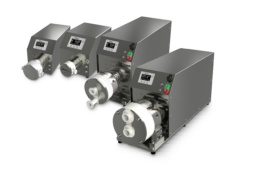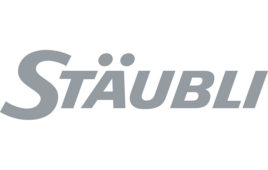KORSCH America Inc., a unit of KORSCH AG, has been servicing clients in North and South America for more than 25 years, offering new and pre-owned equipment. The company also maintains a full test laboratory for equipment demonstrations, product trials, and factory acceptance testing.
Services include equipment installation and validation; troubleshooting and diagnostic support; preventative maintenance and calibration; training certification; machine upgrades, overhauls, and rebuilds; control system upgrades and network integration; and process optimization support.
At INTERPHEX 2018 in April, KORSCH unveiled brand new tablet press technology at its booth exhibit.
Pharmaceutical Processing asked longtime KORSCH America President Frederick J. Murray about the company, its approach to the market, its latest technology, and how he sees the market shaping up in the future.

At INTERPHEX 2018, KORSCH introduced its 4th generation XL 400 machine. (Image credit: KORSCH)
Q: KORSCH America has served the markets in the Americas for 25+ years. What have been the biggest accomplishments for the company during that time?
Frederick J. Murray: Over 25+ years, KORSCH has earned a reputation for innovation and a willingness to develop special technologies which are required by our customers. The punch twist technology for products without lubrication, the deep fill multi-layer technology for OROS products, and the microchip-in-tablet technology for patient compliance, are all excellent examples of customer driven innovation that originated in the Americas.
KORSCH also has earned a reputation for superior customer service—combining an experienced team of talented service engineers with an internal culture geared toward listening, understanding, and responding to the customer needs.
Q: KORSCH is universally recognized for its tablet compression technology. What makes the KORSCH technology stand apart from others in the market?
Murray: KORSCH is the true specialist in tablet compression technology, and for nearly 100 years, our total and complete focus has been around innovation and customer service. Working in response to customer and market requirements, KORSCH has developed the most flexible line of tablet compression equipment to address increasing pressure on improved productivity and uptime.
The XL 400 MFP offers a single-layer, bi-layer, tri-layer, tablet-in-tablet, and microchip-in-tablet capability on a single machine platform, and with fully interchange parts with the XL 400 SFP, which is geared for single-layer tablets only.
KORSCH also extends the flexible design to product development and scale-up, with the XM 12, a portable, small-scale machine that offers single and bi-layer conversion flexibility.
The KORSCH TRP series has been optimized for deep fill 3-layer and 5-layer OROS applications, and is the clear standard in this specialized space.
More recently, KORSCH has taken a leading role in continuous manufacturing, which leverages the use of our standard PLC platform (Siemens or Allen-Bradley) for seamless integration to the central line SCADA system.
Q: Specifically in pharma, the tablet presses are used for a variety of applications, including data acquisition and analysis. How do they support those two functions?
Murray: We offer a comprehensive range of machines for feasibility, small-scale development, and scale-up, including a data acquisition capability that will analyze the compression force waveforms.
The PharmaResearch Data Acquisition System collects and automatically analyzes the data to permit formulation development and process optimization. Compression profiles may be generated to define the relationship between compression force, tablet hardness, and tablet dissolution at different operating speeds. Ejection force profiles may be used to optimize the lubricant system.
A compression curve overlay function permits products to be characterized, or “fingerprinted” to support future troubleshooting efforts. This function also permits the process on different sized tablet presses to be compared to support scale-up efforts.
_______________________________________________________________________________
‘Future machines will have smart sensors that will anticipate potential risks of downtime and provide proactive feedback to take remedial action before problems occur.’
_______________________________________________________________________________
Q: When projecting out over the next 5 to 10 years, what changes do you see developing in the market and will it have any impact on tablet press design and capabilities?
Murray: Over the next 5-10 years, products are going to get more complicated as more efficient and effective drug delivery platforms are developed. In addition, the pressure on uptime and productivity will only increase. KORSCH is extremely well prepared to meet these challenges given the flexible design platform and emphasis on fast change and on-board help on the HMI.
Future machines will have smart sensors that will anticipate potential risks of downtime and provide proactive feedback to take remedial action before problems occur. The tablet press will be fully integrated to the central site SCADA to permit comprehensive data management, and automated OEE tracking. Technical service and customer training will be supplemented by new technologies based on augmented and virtual reality platforms.
Continuous manufacturing technology will also gain favor to streamline product development and transfer to production scale. KORSCH is already well positioned in the CM marketplace and has extensive experience with the integration of the KORSCH press in continuous lines.
The integration of analog level sensors on the material inlet, NIR, and RAMAN probes in the feeder, and the seamless read and write communication with the central line SCADA permits the press to be fully controlled remotely, while passing all critical quality parameters to the line historian.
Finally, there will be more products that require high-containment (OEB 4/OEB 5) technology at both the development and manufacturing scale, fully integrated tablet compression systems, which incorporate air handling, contained peripherals, and a recipe-driven wash-in-place capability. KORSCH offers a complete equipment range of WipCon technology, including the XL 400 MFP WipCon, which incorporates multi-layer flexibility in a high-containment platform.
Q: KORSCH America introduced a new machine at INTERPHEX this year. Can you give us some details about the new equipment, the advancements it offers to the market, and the potential benefits it will provide to users?
Murray: The XL 4004 is the 4th generation XL 400 machine. Since 1998, the XL 400 has offered a new standard in tablet press technology with an innovative carrier plate design and the placement of all major press components in the rear multi-function cabinet. The FT version incorporated a fast change capability, and more recently, the XL 400 MFP incorporated the inherent flexibility to produce single-layer, bi-layer, tri-layer, tablet-in-tablet, and microchip-in-tablet formats.
The XL 4004 is available in both a single-layer only (SFP) execution and fully flexible (MFP) execution. The SFP and MFP share common components and interchangeable turrets to ensure fully compatibility in a production environment where the product portfolio includes both single-layer and multi-layer tablets.
The XL 4004 further enhances the XL 400 concept with an integrated electrical cabinet to permit a smaller footprint, and a highly advanced torque drive to provide precise and robust control under all operating conditions. In addition, the water-cooled torque drive and integrated cabinet permit a completely closed machine. The new Smart-Touch HMI incorporates a wide range of on-board help features, while maintaining the standard Siemens or Allen-Bradley PLC platform.
The benefit is a fast change, fully flexible machine, without a remote electrical panel, which will offer high-speed, maximum efficiency, versatility, and reliability.
_________________________________________________________________________________
‘KORSCH is always evaluating other potential markets and opportunities, and in many cases we are driven by customers who need a tablet compression technology that does not yet exist’
_________________________________________________________________________________
Q: What was behind the decision to develop this new equipment and are you providing demonstrations or instructional sessions at your booth during the show?
Murray: KORSCH has continued to innovate for nearly 100 years. Every machine can be improved and the development of the XL 4004 reflects that philosophy. The elimination of the main electrical cabinet while preserving the standard PLC controls platform permits the XL 400 technology to be used in smaller rooms. The design compatibility between the XL 4004 SFP and XL 4004 MFP permit the technical design advantages to be leveraged in any production environment.
The XL 4004 MFP model will be presented at the INTERPHEX show. This machine will be displayed in a single-layer mode, however, a simple set of conversion kits will permit the same machine to produce bi-layer, tri-layer, tablet-in-tablet, and micro-chip in tablet formats.
Q: Does KORSCH America also offer design and planning services to help pharmaceutical manufacturers incorporate the latest technology into their existing systems?
Murray: KORSCH America offers a wide range of support services, including project management, engineering, automation, training, qualification, and process optimization. All projects are managed professionally and KORSCH engineers can integrate the tablet press to virtually any peripheral device—including tablet dedusters, metal detectors, tablet testing systems, external lubrication systems, and downstream packaging lines.
Our automation group is fully self-sufficient and can support network integration, including domain login, central product recipe management, central batch data storage, and the use of central SCADA or historian systems. KORSCH offers in-house and on-site training programs which are geared to machine operation and maintenance.
The company offers comprehensive validation support as well as a process optimization service, which is geared toward achieving gains in output, product quality, and production yields.
Q: Please tell us about the importance of multi-layer technology in today’s pharma market? Will such technology be expanded beyond five-layers, or is that the max possible?
Murray: Multi-layer technology continues to emerge as the technology of choice for combination and immediate/sustained release products. KORSCH offers both standard fill depth and deep fill depth capability to accommodate an extremely wide range of drug delivery designs.
The development of the five-layer technology was originally based on the need to incorporate barrier layers in a tri-layer tablet design. Future capability that requires in excess of five-layers is not presently in discussion, but according to our experience, nothing can be ruled out.
Tablet-in-tablet and microchip-in-tablet technologies are also gaining favor for a variety of applications, including combination products, increased tamper resistance, and for products that require an extremely high level of compliance.
Q: With drug delivery platforms gaining momentum, such as tablet in tablet, compression coated tablets, and micro-tablets, is there yet another platform in development for introduction?
Murray: KORSCH has extensive experience with specialty products, including tablet-in-tablet and micro-tablets. Both formats are gaining in popularity and KORSCH has developed specialized technology to ensure optimized performance, including placement accuracy (tablet-in-tablet), and high-speed multi-tip production (micro-tablets).
The microchip-in-tablet, which uses an ingestible sensor to confirm compliance, is an innovative technology that has just been granted an NDA approval by FDA. The sensor will document and confirm that a tablet was ingested and can therefore ensure compliance to the prescribed medical regiment. This smart-tablet technology has tremendous potential to improve overall effectiveness and reduce the soaring costs of non-compliance.
Q: In addition to pharmaceutical applications, your tablet compression equipment is used in nutritional, vitamin, chemical, detergent, and battery production. Are you eyeing other product markets for expansion?
Murray: KORSCH is the specialist in tablet compression technology, and our expertise and experience covers pharmaceutical, nutritional, food, confectionary, chemical, detergent, and battery production. KORSCH has been particularly dominant in the battery production market, offering best-in-class technology for AA, AAA, C, and D size battery production, for more than 25 years. KORSCH also offers flexible machines for the detergent market, with bi-layer and tri-layer technology for both laundry and dishwashing applications.
KORSCH is always evaluating other potential markets and opportunities, and in many cases we are driven by customers who need a tablet compression technology that does not yet exist. At the same time, we remain focused on and committed to our core competency—which is developing innovative tablet compression equipment for our global customer base.
________________________________________________________________________________
An earlier version of this article can be found in the INTERPHEX 2018 Show Daily: Tuesday, April 17.
Follow us on Twitter and Facebook for updates on the latest pharmaceutical and biopharmaceutical manufacturing news!



